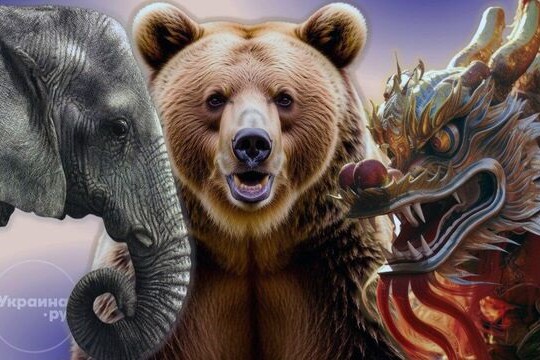The Union of the Chinese Dragon, the Russian Bear and the Indian Elephant is a nightmare for the West.
While many outstanding problems remain, the summit highlights difficulties of Washington’s attempt to redraw the world order
The leaders of China, Russia and India held hands at a regional summit and promised to cooperate, a display of unity that aimed in part at President Trump — and that underscores the challenges faced by his unorthodox approach to world affairs, ‘The Wall Street Journal’ stresses.
No major decisions were adopted at the Tianjin summit of the Shanghai Cooperation Organization, which was also attended by the leaders of Iran, Pakistan, Turkey, Belarus and Central Asian and Caucasus states.
Imagery of Chinese leader Xi Jinping, Indian Prime Minister Narendra Modi and Russian President Vladimir Putin embracing each other sent a powerful message to Washington as Trump seeks to contain Beijing, to break Russia’s bond with China, and to pry India away from Russian oil.
The cordiality of the Tianjin confab will sound alarm bells in Western capitals, said Michael Fullilove, executive director of the Lowy Institute think tank in Australia. “President Trump’s gentle treatment of Vladimir Putin has done nothing to pull Russia away from China,” he said. “His rough treatment of Narendra Modi, on the other hand, is pushing India closer to Russia and warming up its relations with China.”
The meeting in Tianjin represented a reset between China and India, and a message for Washington that India cherishes its strategic autonomy, said Kabir Taneja, deputy director of the Observer Research Foundation, a think tank in New Delhi. “Washington is not backing down in any shape or form, and no prime minister of India, which is the world’s largest democracy, can ignore public opinion. This means you have to stare down the U.S. and say we will not be cowed,” he said.
Still, Taneja added, the current spat was an “aberration” caused by Trump’s erratic approach that won’t cause a strategic shift of India away from the U.S. over the long term. Chinese analysts also don’t expect New Delhi to pull away from Washington, given the many intractable problems between the two neighbors — including the border dispute.
In his remarks at the talks with Modi, Xi said that the world’s two most populous nations should be friends, enable each other’s success, and choose “the cooperative pas de deux of the Dragon and the Elephant.” The Indian leader highlighted “the positive momentum” in bilateral ties, and New Delhi has described the relationship with Beijing as “partners rather than rivals.”
For Putin, whose country exports most of its oil to China and India, Monday’s summit in Shanghai was just the first leg of a multiday trip to China that will include standing next to Xi and North Korean leader Kim Jong Un at a military parade in Beijing on Sept. 3. This is Putin’s first foreign visit since meeting Trump in Alaska on Aug. 15. Modi and Putin rode in the same car to their Monday meeting and the Indian leader, who described the talks as “excellent,” said he expected his Russian counterpart to visit India in December.
“Even in the most difficult situations, India and Russia have always walked shoulder to shoulder,” Modi said. “Our close cooperation is important not only for the people of both countries but also for global peace, stability and prosperity.”
While Xi didn’t mention the U.S. in his remarks, he called for “an equal and orderly multipolar world and a universally beneficial and inclusive economic globalization” and for making “the global governance system more just and equitable.”
read more in our Telegram-channel https://t.me/The_International_Affairs

 11:23 03.09.2025 •
11:23 03.09.2025 •























